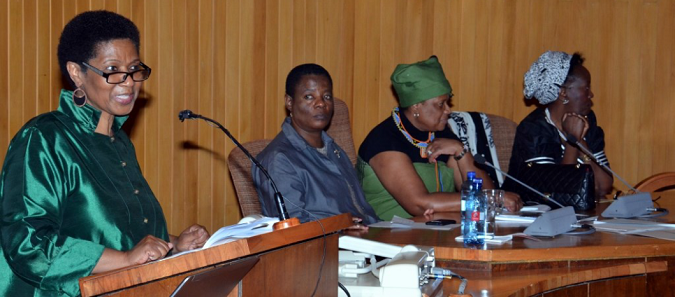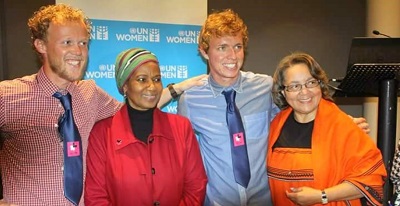UN Women’s Executive Director calls for hastening of achievement of gender equality and women’s empowerment
Date:

During her recent visit to South Africa to mark the Women’s month in South Africa, the ED said that although a review on the progress made since the historic conference 20 years ago in Beijing showed that countries around the world had enacted more and better laws promising gender equality, the hard truth is that no country in the world has achieved gender equality.
She observed that despite advances that have been made, the Beijing+20 reviews have found that there are clear gaps between the laws and their actual implementation.
“For example, although South African law prohibits sex-based discrimination, we know that women here continue to experience bias and inequality in all aspects of life and at all ages. This glaring gap between policy and practice is not unique to South Africa. Around the world, we have seen that discriminatory social norms, gender stereotypes and unequal power relations between women and men have been too slow to change,” she said.
Dr. Mlambo-Ngcuka stressed the need to seize all opportunities at national, regional and global levels to ensure that gender is mainstreamed across all policy areas and implemented at all levels.
During her ten day visit to South Africa, the ED attended various events and all of these she called on more action towards ensuring gender equality.
The ED attended the Africa Regional Conference of the South African Chapter of the International Association of Women Judges (SAC-IAWJ) where she gave a keynote address “Beyond Words, beyond 2015: embracing the discourse of legal implementation to realize Planet 50-50.”
She underscored the pivotal role that the judiciary has in the implementation of the Sustainable Development Goal 16 which calls for the promotion of peaceful and inclusive societies for sustainable development, provision of access to justice for all and building effective, accountable and inclusive institu-tions at all levels.
The ED, however noted that the role of the judiciary went beyond SDG 16 as they had the critical responsibility of driving the successful implementation of the new development agenda in its totality by ensuring that the law is enforced in the implementation.
Towards gender equality, the ED said that the judiciary can help to ensure that all discriminatory laws against women are eliminated, including family laws, penal codes, nationality laws, and laws relating to inheritance, ownership and control over land and other resources.
The ED also attended a Brunswick Women’s break-fast to mark the South Africa Women’s Day and gave a key note address on “The role of private sector in ending gender inequality in this generation”. Brunswick, founded in 1987, is an advisory firm specializing in critical issues and corporate relations: a global partnership with 23 offices in 14 countries.
Dr Mlambo-Ngcuka stressed those sustainable results for women’s economic empowerment can only be achieved by creating enabling environments, including in the Private Sector, which promote women’s full economic participation and secure their rightful position in society as agents of change.
And at a UN Women’s National Flagship Event to celebrate Beijing+20, the SDGs and South Africa’s Women’s Month, the ED identified South Africa’s major achievements as:
- the alignment of the country’s legislative framework with international human rights standards;
- the progressive expansion of women’s role in politics and in decision-making positions both in the public and the private sectors; and
- the enacting of institutional mechanisms that promote women’s human rights. However, despite these advances, the Beijing+20 review of South Africa found clear gaps between the laws and their actual implementation

Dr. Mlambo-Ngcuka disclosed that UN Women is now in the process of drafting a new strategy on Youth to strengthen initiatives for the empowerment of young women and to develop young men as partners in gender equality and women’s rights.
“With half of the world’s population today being under the age of 30, and with the projection that this number will rise to 75 per cent by 2025, young people have a critical role to play in achieving transformative change,” she said.
She appealed to young men to actively join in the HeForShe campaign which calls on men and boys from around the world to take steps to advance gender equality.